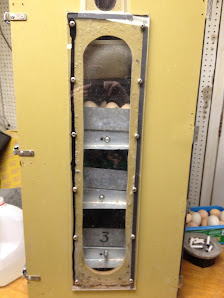Here's a little water cooler gossip. You know who I don't like? Squash Vine Borers! SV Borers are actually moths that lay their larvae near squash plants. When the larvae hatch, they burrow into the center of the squash vine, where they will consume the plant from the inside. Since this destroys the plant's water and delivery structure, the plant will ultimately die.
 |
A squash vine borer that reaped havoc on my
Ohio squash plants. I battled them every season. |
If your once-prolific squash plant suddenly stops producing fruit, this could be an early sign of a squash vine borer infestation. Search the stems for a deposit that looks like little bits of sawdust leaking out of the plant. This is the borer's waste, which gets pushed out behind it as it makes its way through the plant.
Borers always seemed to hit my squash crops by August and while my methods to combat them extended the season a bit, I ultimately seemed to loose the battle. The methods of control I tried included covering the squash vines with foil so the borers can't get in. Perhaps this would have worked better if I'd been more aggressive about it....but squash plants grow
quickly and besides, I always felt like that made my garden look like I was attempting to communicate with alien life forms via my garden gourds. I once tried using netting to keep the moths out. This meant I had to q-tip pollinate my squash, and they ultimately still got infected...most likely because they were planted near to a previous infestation and the larvae can hide out and over-season in the soil and come up when the soil warms.
 |
| Wikipedia Image of the borer in moth form. |
The last line of defense is to do a little garden surgery at the infected area. Take a sharp knife to cut into the vine until you find the borer, and then extract it. Don't stop at just when you find one, as there are often multiple borers in one hole. You can add
diatomaceous earth (DE), (an organic-approved pest control that consists of a type of naturally occurring sedimentary rock that dries out the insects that come into contact with it) to the infected spot in case you missed something. DE will affect good insects too like earthworms and bees, so I use it judiciously at the infection point and never near the flowers that will attract pollinators. You can then bury the cut area in well-composted soil and hopefully it will put out new roots in that section. If the vine is long I try to pre-emptively look for sections to bury so that my vine has multiple areas to pull water from. It will put out roots from any of its vine joints.
 |
| Icicle Radish (Photo from gardening.about.com) |
One VERY exciting thing I learned about at the
2013 South Carolina Organic Growers Conference, which Ches and I attended last week, was that the Icicle Radish will repel squash vine borers. We got a pack of seeds and plan to put them around our squash. Their seasons for radishes and squash aren't the same, so most of these radishes will just sit as deterrent crops and be allowed to go to seed rather than being harvested.
Other Squash Vine Borer deterrent ideas are most welcome! I am hoping they just aren't as bad in North Carolina as they were in Ohio. Also, with significantly more land, we will finally be able to truly adopt a crop rotation system which should help alleviate perennial squash moth visitations.











